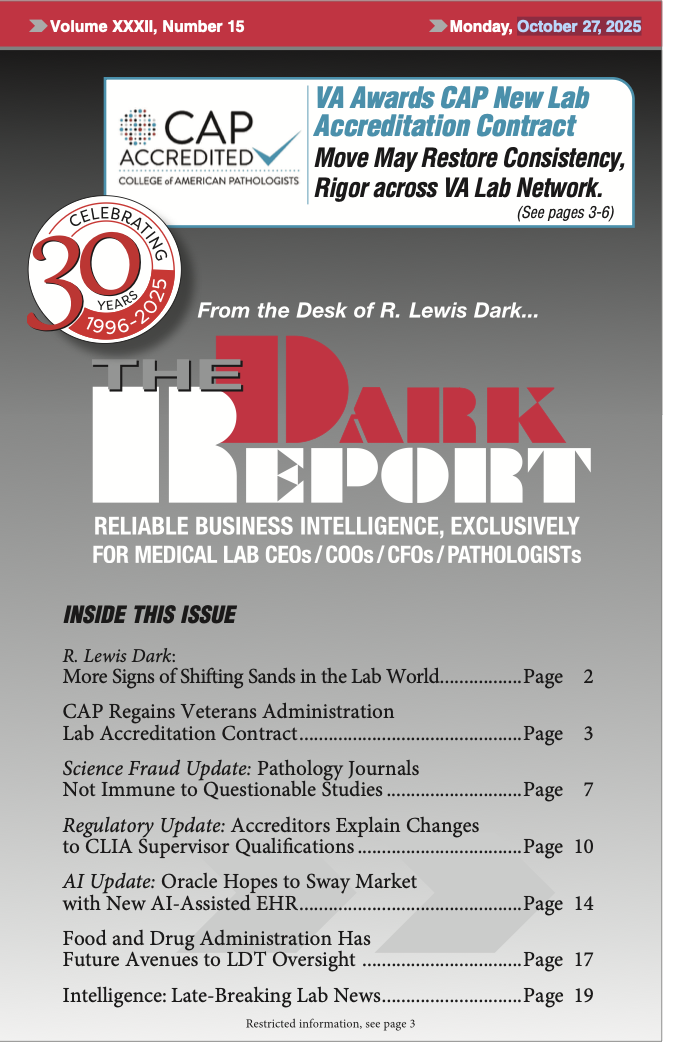Robert Michel
 Until Robert L. Michel came along and founded The Dark Intelligence Group (DIG) two decades ago, the clinical laboratory industry and the anatomic pathology profession lacked a trustworthy source for information about the management and operations of medical laboratories. From its inception in 1995, The Dark Report quickly became the “go to” source of industry intelligence, innovations in lab management, and strategic market analysis.
Until Robert L. Michel came along and founded The Dark Intelligence Group (DIG) two decades ago, the clinical laboratory industry and the anatomic pathology profession lacked a trustworthy source for information about the management and operations of medical laboratories. From its inception in 1995, The Dark Report quickly became the “go to” source of industry intelligence, innovations in lab management, and strategic market analysis.
This excellence in reporting has earned recognition from his peers. For example, twice Michel and The Dark Report have won national awards for best investigative reporting by the Specialty Information Publishers Association. In 2005, the award was for Michel’s coverage about how the anatomic pathology condominium laboratories (pod labs) operated by urologists and gastroenterologists came to be, who operated them, and how these owners marketed the AP condo labs to other physician groups. In 2009, Michel’s award for best investigative reporting resulted from his published interviews with Quest Diagnostics Incorporated when the company admitted that, for a period of 18 months, it had been reported inaccurate Vitamin 25(OH) D results because of problems with its laboratory-developed test methodology. The Dark Report’s story was picked up by The New York Times and was in the national news cycle for several days.
In his role as Editor-in-Chief, Michel brought unique capabilities to DIG and The Dark Report. His management training and diverse business experience—along with his skills as a concise writer and analyst—proved to be a winning combination for readers of The Dark Report. For that reason, Michel’s story has many intriguing elements.
Immediately prior to founding DIG, he had served in several executive positions for Nichols Institute based in Portland, Oregon, and San Juan Capistrano, California. This was during the time that Nichols Institute was an independent public lab company with annual revenues of about $280 million (prior to its acquisition by MetPath, Inc., now Quest Diagnostics Incorporated). He traveled extensively to many of the clinical lab business units owned by Nichols Institute in different regions of the United States and played a role in formulating effective market strategies in response to the emergence of closed-panel HMOs, capitated pricing, and full-risk managed care contracts, among other successful management initiatives.
Prior to his service at Nichols Institute, Michel served at three different Fortune 100 companies. These were Procter & Gamble, Centex Corporation, and Financial Corp. of America. Each was an opportunity to master new management techniques and apply them in different industries. Between these positions, he gained experience as an entrepreneur, having founded a real estate development firm and a general contracting company in the Southeastern United States.
Robert Michel earned a Bachelor of Arts degree in Economics at the University of California, Los Angeles, where he played rugby, a sport he participated in for another 22 years. He is a native of California and grew up in Santa Ana.
Articles by Robert Michel
Roche/Affymetrix Microarray Cleared for Clinical Use by FDA
From the Volume XII No. 1 – January 3, 2005 Issue
MOLECULAR DIAGNOSTICS took a big step forward in December. During the month, the Food and Drug Administration (FDA) cleared the first microarray instrument system and microarray-based laboratory test for clinical use. The FDA announced on December 23, 2004 that it had cleared the Ge…
Florida Medicaid Contract Is On-Again, Off-Again
From the Volume XII No. 1 – January 3, 2005 Issue
CEO SUMMARY: Start with a flawed idea: Medicaid lab testing costs in Florida can be cut by awarding an exclusive statewide contract to one laboratory company. Compound that bad idea by designing a contract awards process that guarantees the state will pay twice for a number of tests while…
“January 3, 2005 Intelligence: Late Breaking Lab News”
From the Volume XII No. 1 – January 3, 2005 Issue
More evidence of the move to an all computer economy has surfaced. During 2003, consumer use of credit cards, debit cards, and other electronic payment methods eclipsed paper checks for the first time. The study was done by the Federal Reserve Bank of Atlanta. It reports that 36.7 bi…
Change Beneath Surface Marks 2004 Lab Stories
From the Volume XI No. 17 – December 13, 2004 Issue
CEO SUMMARY: Presented here are THE DARK REPORT’S “Ten Biggest Lab Stories of 2004.” These are the events we consider most important to the lab industry during the year. However, in contrast to past years, 2004 lacked the types of blockbuster events which radically change and reshap…
British Early-Adopter Labs Respond to New Trends
From the Volume XI No. 17 – December 13, 2004 Issue
CEO SUMMARY: On which side of the Atlantic are clinical labs better operated? This February will be the third consecutive year that progressive lab leaders from the USA and the United Kingdom convene in England to explore each country’s laboratory best practices, to swap innovations, an…
Direct Access Testing Must Serve Consumers
From the Volume XI No. 17 – December 13, 2004 Issue
CEO SUMMARY: As growing numbers of people enroll in consumer-directed healthcare benefit programs, laboratories will need to develop ways to directly service the needs of patients interested in ordering their own laboratory tests. That’s one reason Pathology Associates Medical Laborator…
Less Complex IT Technologies Will Propel Use of The Internet
From the Volume XI No. 17 – December 13, 2004 Issue
EXPERTS in information technologies (IT) predict that the next paradigm shift in IT will come from reducing the complexity of software and hardware. Analyst Steven Milunovic of Merrill Lynchstates that, as complex IT systems are simplified for users, every single employee will be ex…
Bar Codes vs. RFID Tags: Labs Will Need Both
From the Volume XI No. 17 – December 13, 2004 Issue
CEO SUMMARY: Take everything you liked about bar code tracking. Eliminate the problems of reading bar codes. What results is the promise of radio frequency identification devices, or RFIDs. In the United States, it is already finding uses in blood transfusion, patient identification, and …
“December 13, 2004 Intelligence: Late Breaking Lab News”
From the Volume XI No. 17 – December 13, 2004 Issue
THE DARK REPORT once again was first with timely intelligence. This time we scooped Business Week and other national business sources with our analysis of the impending arrival of HPV vaccines—presented in our November 22, 2004 issue. Business Week published their HPV vaccine stor…
Big Seattle Med Center Adopts “Lean” Methods
From the Volume XI No. 16 – November 22, 2004 Issue
CEO SUMMARY: Laboratory and pathology services at Virginia Mason Medical Center are an integral part of its hospital-wide Lean quality management initiative. Because of the importance of lab test data to so many clinical services, the laboratory often finds itself making key contributions…
CURRENT ISSUE

Volume XXXII, No. 15 – October 27, 2025
The Dark Report examines the momentous decision by the VA to switch accreditors from The Joint Commission to CAP. Also, we analyze retractions in pathology journals to gain insight into scientific fraud.
See the full table of contentsHow Much Laboratory Business Intelligence Have You Missed?
Lab leaders rely on THE DARK REPORT for actionable intelligence on important developments in the business of laboratory testing. Maximize the money you make-and the money you keep! Best of all, it is released every three weeks!
Sign up for TDR Insider
Join the Dark Intelligence Group FREE and get TDR Insider FREE!
Never miss a single update on the issues that matter to you and your business.
Topics
- Anatomic Pathology
- Clinical Chemistry
- Clinical Laboratory
- Clinical Laboratory Trends
- Digital Pathology
- Genetic Testing
- In Vitro Diagnostics
- IVD/Lab Informatics
- Lab Intelligence
- Lab Marketplace
- Lab Risk & Compliance
- Laboratory Automation
- Laboratory Billing
- Laboratory Compliance
- Laboratory Equipment
- Laboratory Information Systems
- Laboratory Management
- Lean Six Sigma
- Managed Care Contracts
- Molecular Diagnostics
- Pathology Trends
- People
- Uncategorized

